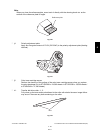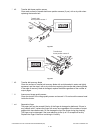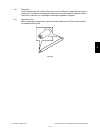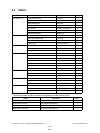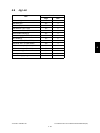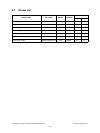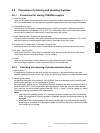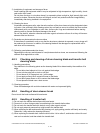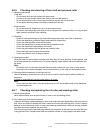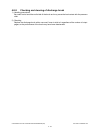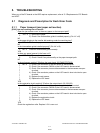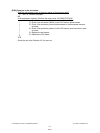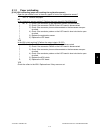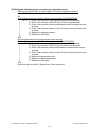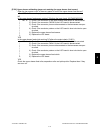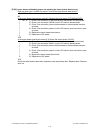
June 2005 © TOSHIBA TEC e-STUDIO281c/351c/451c PREVENTIVE MAINTENANCE (PM)
4 - 33
4
4.8.6 Checking and cleaning of fuser belt and pressure roller
1) Handling precautions
Fuser belt
- Do not touch the fuser belt surface with bare hands.
- Prevent oil or other foreign matter from staining the fuser belt surface.
- Do not allow alcohol or any other organic solvent to contact with the fuser belt.
- Do not apply external pressure that might scratch the fuser belt.
Pressure roller
- Do not leave any oil (fingerprints, etc.) on the pressure roller.
- Be careful not to allow any hard object to hit or rub against the pressure roller, or it may be dam-
aged, possibly resulting in poor cleaning.
2) Checking
- Check for stain and damage on the fuser belt and pressure roller, and clean if necessary.
- Check the separation guide and fingers and check for chipped tips.
- Check the cleaning effect of the cleaning roller.
- Check the thermistors for proper contact with the pressure roller.
- Check the fused and fixed condition of the toner.
- Check the gap between the inlet guide and pressure roller.
- Check the fuser belt for proper transportation.
- Check the pressure roller for proper rotation.
3) Cleaning procedure
When the fuser belt and pressure roller become dirty, they will cause jamming. If this happens, wipe
the surface clean with a suitable cloth. For easier cleaning, clean the belt and roller while they are
still warm.
Note: Note:
Be careful not to rub the fuser belt and pressure roller surface with your nails or hard objects
because it can be easily damaged. Do not use silicone oil on the fuser belt and pressure roller.
4) Checking after the assembly of the fuser belt unit
After the assembly, rotate the fuser belt for a round to confirm that the belt is neither folded nor
scratched.
A folded or scratched belt may be broken when it is in use.
Note: Note:
Never rotate the fuser belt in the reverse direction as it will cause deformation of the thermistor
and discharge brush.
4.8.7 Checking and replacing the oil roller and cleaning roller
1) Handling precautions
Never allow solvents such as paint thinner to touch to the oil/cleaning rollers.
2) Poor cleaning and corrective treatment
Judgment should be made depending on how much toner has been deposited on the fuser belt sur-
face. When its surface is stained with toner, check the oil roller and cleaning roller. If toner is heavily
adhered on the oil/cleaning rollers, it means the cleaning performance is declined and the oil/clean-
ing rollers should be replaced with new ones.
The oil/cleaning rollers are gradually degraded due to subjection to the heat from the fuser belt over
a long period of time. Replace them after the specified number of output pages have been made.



